
Gadjah Mada University is a public research university located in Sleman, Special Region of Yogyakarta, Indonesia. Officially founded on 19 December 1949, Gadjah Mada University is one of the oldest and largest institutions of higher education in the country, and has been credited as one of the best universities in Indonesia. In the 2024 QS World University Rankings, UGM is ranked 2nd in Indonesia and 263rd in the world.
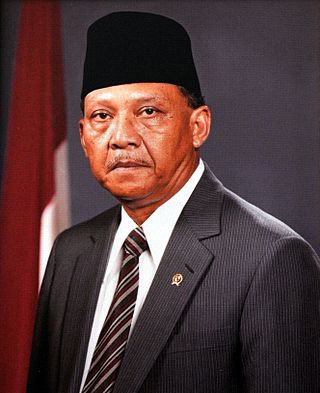
Umar Wirahadikusumah was an Indonesian politician and former army general, who served as the fourth vice president of Indonesia, serving from 1983 until 1988. Previously, he was chair of the Audit Board of Indonesia from 1973 until 1983, and Chief of Staff of the Indonesian Army from 1969 until 1973. Born to a noble Sundanese family, he was educated at the Europeesche Lagere School Tasikmalaya and Meer Uitgebreid Lager Onderwijs Pasundan. He entered the military in 1943, during the Japanese occupation. He would go on to serve in the Indonesian Army during and after the Indonesian National Revolution, seeing combat in the Madiun Affair and the PRRI rebellion.

Herman Johannes was an Indonesian professor, scientist, politician and National Hero. Johannes was the rector of Universitas Gadjah Mada in Yogyakarta (1961–1966), Coordinator for Higher Education from 1966 to 1979, a member of Indonesia's Presidential Supreme Advisory Council from 1968 to 1978, and the Minister for Public Works and Energy (1950–1951). He was also a member of the Executive Board of UNESCO from 1954 to 1957.

Selo Soemardjan, also spelled as Selo Sumarjan or Selo Sumardjan, was a well known senior academic in sociology at the University of Indonesia, and is known as the Pioneer of Indonesian Social Sciences. He was awarded with the title Kanjeng Pangeran Haryo, a knighthood from the Yogyakarta Sultanate.
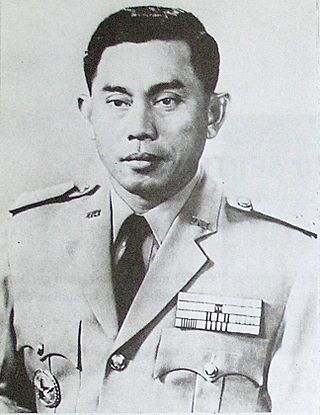
General Ahmad Yani was the Commander of the Indonesian Army, and was killed by members of the 30 September Movement during an attempt to kidnap him from his house.
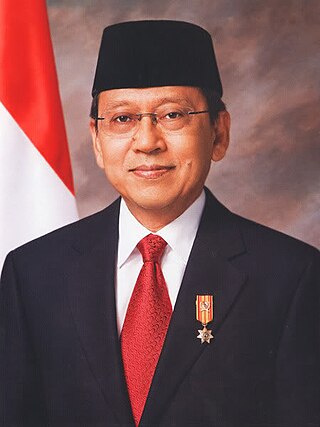
Boediono is an Indonesian politician and economist. He was the 11th vice president of Indonesia, in office from 2009 to 2014. He became vice president after winning the 2009 presidential election together with the then-incumbent President Susilo Bambang Yudhoyono. Before this, he had been the Governor of the Indonesian Central Bank and a professor of economics at Gadjah Mada University.

The National Main Heroes' Cemetery in Kalibata, colloquially known as Kalibata Heroes' Cemetery, is a military cemetery in Kalibata, South Jakarta, Indonesia. It was built in 1953 and opened on 10 November 1954. Bacharuddin Jusuf Habibie was the first Indonesian President to be buried in the cemetery following his death on 11 September 2019. Former Indonesian foreign minister Agus Salim, who died 6 days before the cemetery was opened, was the first senior politician buried in the cemetery. There were also 121 bodies moved from Heroes' Cemetery in Ancol.

Hasri Ainun Habibie was an Indonesian physician and wife of former President B. J. Habibie. She served as First Lady of Indonesia from 1998 to 1999.
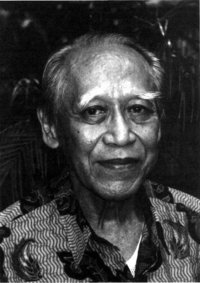
Kanjeng Pangeran Haryo Prof. Dr. Koentjaraningrat was an Indonesian anthropologist. He is sometimes referred to as "the father of Indonesian anthropology".
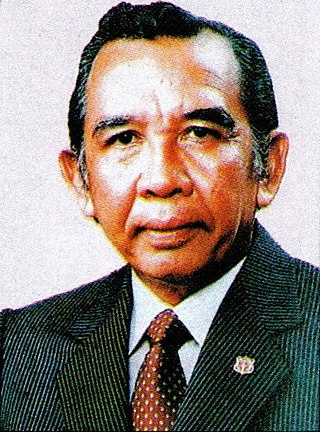
Lieutenant General Ismail Saleh was Prosecutor General and later Minister of Justice of Indonesia.

General Raden Oerip Soemohardjo was an Indonesian general, the first chief of staff of the Indonesian National Armed Forces, and the interim Commander of the Indonesian National Armed Forces. He received several awards from the Indonesian government, including the title National Hero of Indonesia in 1964. He was also a recognized Catholic by the Holy See, by which Pope Paul VI dedicated a memorial chalice for him with a Latin inscription acknowledging his legacy.

Giri Tunggal Heroes' Cemetery is a cemetery in Semarang, Central Java. It contains the graves of military personnel and other persons deemed heroes by the Indonesian government, including the National Hero Albertus Soegijapranata. As of 2011 it has 1,843 interments.

Brigadier General Raden Panji Nugroho Notosusanto was an Indonesian short story writer turned military historian who served as a professor of history at the University of Indonesia. Born to a noble family in Central Java, he exhibited a high degree of nationalism from a young age. During the Indonesian National Revolution from 1945 to 1949, he saw active service as a member of the Student Army, working reconnaissance. Despite wanting to remain in the military, under the influence of his father he continued his education, eventually enrolling in the faculty of literature at the University of Indonesia. During the 1950s he wrote extensively and was active in numerous political and academic groups, finally graduating with a degree in history in 1958.
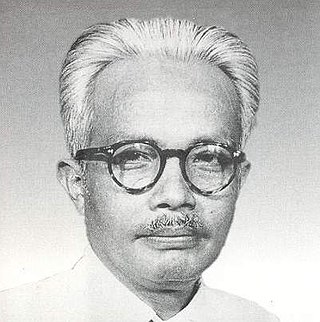
Ki Sarmidi Mangunsarkoro acted as the Minister of Education and Culture of Indonesia in 1949 until 1950. He is now regarded as a National Hero of Indonesia.
Heroes' Cemetery may refer to:

Rear admiral Raden Bagus Idrus Nasir Djajadiningrat, M.A. also known as Didi Djajadiningrat was an Indonesian diplomat and navy officer. He also joined as a fighter for Indonesian independence in 1945 during colonial times. During the New Order period, he later became the People's Representative Council member of the ABRI fraction from Golkar appointed by Suharto.

Doni Monardo was an Indonesian Army lieutenant general who had previously served as the Head of Indonesian National Board for Disaster Management (BNPB). He also served as Chief of the Coronavirus Disease Response Acceleration Task Force during the COVID-19 pandemic in Indonesia. Monardo supported the government's decision to refrain from a country-wide lockdown, arguing doing so would overwhelm the government.
Mubyarto was an Indonesian economist. He was born in Sleman, in Yogyakarta, and became a professor of economics at Gadjah Mada University in Yogyakarta specialising in agricultural economics. He frequently wrote and spoke about challenges of agricultural development in Indonesia. Later in his career he became known for his interest in Pancasila economics and ekonomi rakyat.

Jansen Ibrahim Silaen was an Indonesian politician officer who became the Police Chief of North Sulawesi and Central Sulawesi and Head of the Criminal Investigation Agency. After retiring from the police, he became a politician and served for two terms in the People's Representative Council until his death.



















